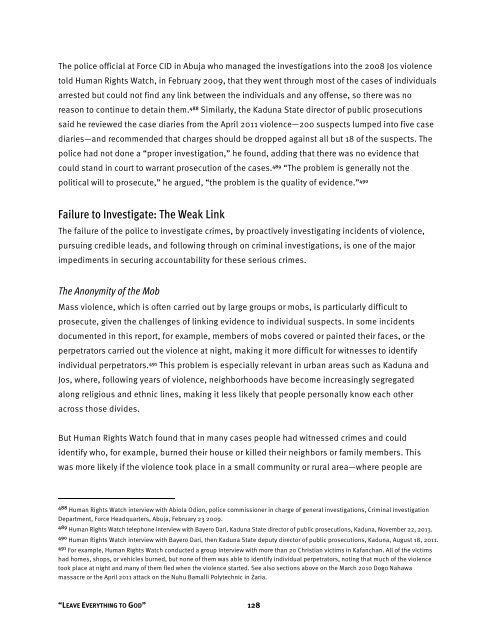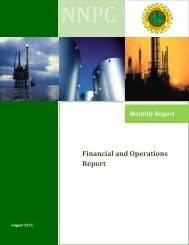You also want an ePaper? Increase the reach of your titles
YUMPU automatically turns print PDFs into web optimized ePapers that Google loves.
The police official at Force CID in Abuja who managed the investigations into the 2008 Jos violence<br />
told Human Rights Watch, in February 2009, that they went through most of the cases of individuals<br />
arrested but could not find any link between the individuals and any offense, so there was no<br />
reason to continue to detain them. 488 Similarly, the Kaduna State director of public prosecutions<br />
said he reviewed the case diaries from the April 2011 violence—200 suspects lumped into five case<br />
diaries—and recommended that charges should be dropped against all but 18 of the suspects. The<br />
police had not done a “proper investigation,” he found, adding that there was no evidence that<br />
could stand in court to warrant prosecution of the cases. 489 “The problem is generally not the<br />
political will to prosecute,” he argued, “the problem is the quality of evidence.” 490<br />
Failure to Investigate: The Weak Link<br />
The failure of the police to investigate crimes, by proactively investigating incidents of violence,<br />
pursuing credible leads, and following through on criminal investigations, is one of the major<br />
impediments in securing accountability for these serious crimes.<br />
The Anonymity of the Mob<br />
Mass violence, which is often carried out by large groups or mobs, is particularly difficult to<br />
prosecute, given the challenges of linking evidence to individual suspects. In some incidents<br />
documented in this report, for example, members of mobs covered or painted their faces, or the<br />
perpetrators carried out the violence at night, making it more difficult for witnesses to identify<br />
individual perpetrators. 491 This problem is especially relevant in urban areas such as Kaduna and<br />
Jos, where, following years of violence, neighborhoods have become increasingly segregated<br />
along religious and ethnic lines, making it less likely that people personally know each other<br />
across those divides.<br />
But Human Rights Watch found that in many cases people had witnessed crimes and could<br />
identify who, for example, burned their house or killed their neighbors or family members. This<br />
was more likely if the violence took place in a small community or rural area—where people are<br />
488 Human Rights Watch interview with Abiola Odion, police commissioner in charge of general investigations, Criminal Investigation<br />
Department, Force Headquarters, Abuja, February 23 2009.<br />
489 Human Rights Watch telephone interview with Bayero Dari, Kaduna State director of public prosecutions, Kaduna, November 22, 2013.<br />
490 Human Rights Watch interview with Bayero Dari, then Kaduna State deputy director of public prosecutions, Kaduna, August 18, 2011.<br />
491 For example, Human Rights Watch conducted a group interview with more than 20 Christian victims in Kafanchan. All of the victims<br />
had homes, shops, or vehicles burned, but none of them was able to identify individual perpetrators, noting that much of the violence<br />
took place at night and many of them fled when the violence started. See also sections above on the March 2010 Dogo Nahawa<br />
massacre or the April 2011 attack on the Nuhu Bamalli Polytechnic in Zaria.<br />
“LEAVE EVERYTHING TO GOD” 128




